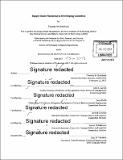Supply chain financing in Developing countries
Author(s)
Breitbach, Timothy W
DownloadFull printable version (20.74Mb)
Other Contributors
Massachusetts Institute of Technology. Engineering Systems Division.
Advisor
John S. Carroll.
Terms of use
Metadata
Show full item recordAbstract
There is no definitive blueprint for ending poverty and increasing prosperity across the globe, but the World Bank argues that inclusive economic growth is critical to achieving global development goals. This thesis focuses on supply chain financing, and its potential to make a positive and lasting impact on people and businesses in resource-constrained environments. It seeks to develop a better understanding of how supply chain and finance structures impact profits, sales growth and risk. The two-phased research design seeks to address the gap in the supply chain and development literature on supply chain finance in small and medium sized firms in developing countries. The first phase consists of exploratory, semi-structured interviews with stakeholders in international development, financing and supply chain management. The exploratory interviews were used to develop an understanding of how relevant stakeholders think about and make supply chain finance decisions. Additionally, the interviews were used to identify a company and supply chain for a multiple case study upon which the second phase of research is based. The company is a clean energy product distributor that has partnered with one of the largest banks in Kenya to provide consumer financing for clean energy products. The case analysis includes an in-depth examination of the company's financial performance by sales channel, drawing upon sales records and accounting documents. Interviews were conducted with the company's management, suppliers, sales force, retailers and bank lending agents. The mixed methods case study is used to extend hypotheses developed during the exploratory interviews and further develop theory on the role of financing in developing country supply chains. The exploratory interviews and case study are used to develop a framework of how stakeholders in consumer durable goods markets think about scale in developing countries. The World Bank's Logistics Performance Index (LPI) and Doing Business Report (DBR) data sets are used to demonstrate how organizations can base supply chain decisions on infrastructure, logistics and governance structures within a country. This research can be used by for-profit and not-for-profit entities when making resource allocation and supply chain design decisions in developing markets.
Description
Thesis: Ph. D. in Engineering Systems, Massachusetts Institute of Technology, School of Engineering, Institute for Data, Systems, and Society, 2017. Cataloged from PDF version of thesis. Includes bibliographical references.
Date issued
2017Department
Massachusetts Institute of Technology. Engineering Systems Division; Massachusetts Institute of Technology. Institute for Data, Systems, and SocietyPublisher
Massachusetts Institute of Technology
Keywords
Institute for Data, Systems, and Society., Engineering Systems Division.